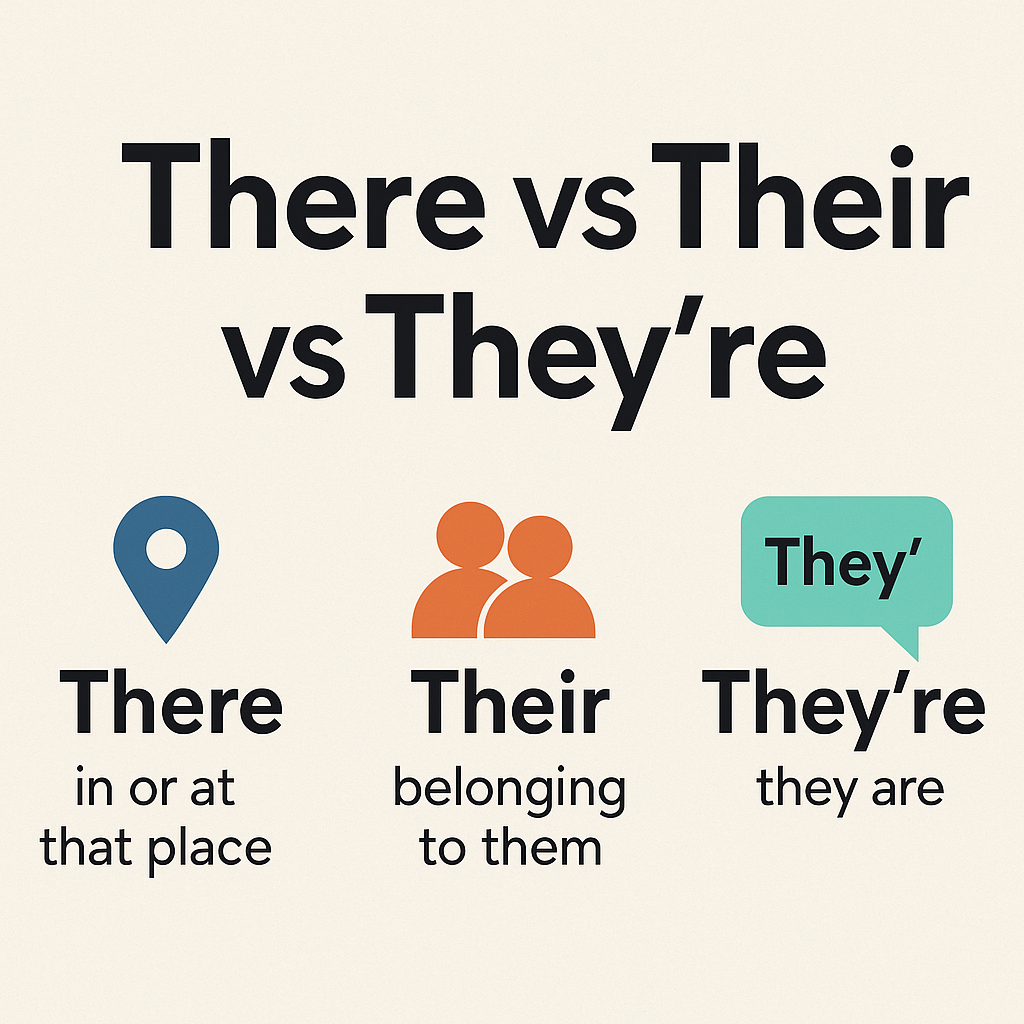There vs Their vs They’re

Among the most frequently confused word sets in English is there vs their vs they’re. These homophones sound exactly the same but have very different meanings and grammatical roles. Misusing them is one of the most noticeable grammar mistakes, especially in emails, essays, and online posts.
- “There” refers to a place or is used to introduce a subject.
- “Their” shows possession.
- “They’re” is a contraction of “they are.”
This article breaks down the confusion around there vs their vs they’re with grammar explanations, real-world examples, and simple memory tips. If you’ve ever paused while typing, unsure of which spelling to use, this guide will help you confidently choose the right one.
Grammatical Explanation of there vs their vs they’re
To understand there/their/they’re, you first need to know the role each word plays in a sentence:
- There – Adverb/Pronoun
Refers to a place or is used to introduce a subject.
Examples:
She lives over there.
There is a book on the table. - Their – Possessive Pronoun
Shows that something belongs to “them.”
Examples:
That’s their house.
Their dog is friendly. - They’re – Contraction
Short for “they are.”
Examples:
They’re going to the store.
They’re excited about the trip.
The key to avoiding mistakes with there/their/they’re is to check what you’re trying to say: a place, ownership, or a contraction. Ask: Am I talking about location, possession, or a subject + verb?
Real-Life Examples of there vs their vs they’re
Here are clear examples to help you choose between there vs their vs they’re:
Correct usage of “There”:
- There is a new student in class.
- Let’s meet over there.
Incorrect usage of “There”:
- Their is no way to fix it.
Should be: There is no way to fix it.
Correct usage of “Their”:
- Their car is parked outside.
- The team celebrated their win.
Incorrect usage of “Their”:
- There home is beautiful.
Should be: Their home is beautiful.
Correct usage of “They’re”:
- They’re not coming today.
- I think they’re ready to start.
Incorrect usage of “They’re”:
- Their going to the party.
Should be: They’re going to the party.
By mastering there vs their vs they’re, you’ll avoid embarrassing and easily preventable grammar errors.
Common Mistakes
The biggest mistake in there/their/they’re is swapping them without realizing it because they sound identical.
Examples:
- Their is a dog in the yard. → “Their” should be “There.”
- They’re house is lovely. → “They’re” should be “Their.”
- There not coming tonight. → “There” should be “They’re.”
Spellcheck doesn’t always catch these errors, especially when all three words are technically spelled correctly. So, it’s up to you to double-check the meaning behind the word you’re using.
Always ask:
- Am I pointing to a place? → There
- Am I showing ownership? → Their
- Am I shortening “they are”? → They’re
Remembering these checks will help you win the there/their/they’re game every time.
Memory Tips
Use these simple tips to remember the difference between there/their/they’re:
- There = Location
Tip: “There” has the word “here” in it. Think location! - Their = Possession
Tip: “Their” has “heir” in it, someone who inherits. Think ownership. - They’re = They are
Tip: Try replacing “they’re” with “they are” in your sentence. If it fits, it’s correct.
Quick check:
- They’re happy → They are happy
- Their car is red → Possessive
- There is the school → Location
These fast memory aids make there/their/they’re easy to remember and even easier to get right in your writing.
For more grammatical tips in our blog
Conclusion
Understanding there/their/they’re comes down to knowing their roles: “there” points to a place or introduces a sentence, “their” shows possession, and “they’re” means “they are.” Practice these rules and use memory tips to catch mistakes before they happen.
Want more help with confusing word pairs? Check out this GrammarBook guide on their/there/they’re for extra practice and examples.